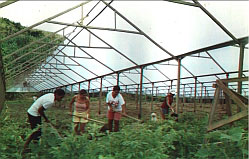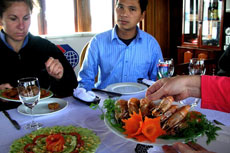Human Flower Project
Friday, July 29, 2005
Floriculture—Women Be Wise
A women’s flower co-op in NE Brazil wins awards to grow on after many lean years.
Women make up the majority of the cut-flower workforce in Latin America and much of the rest of the world, but floriculture business-owners are mostly male.
A group of 21 women in Brazil’s northeastern state of Paraiba banded together and set up their own enterprise in 1999. The Cooperative of Floriculturists of Paraiba has now earned both national and international recognition for entrepreneurship.
 Women of the Paraiba Co-op
Women of the Paraiba Co-op
prepare the greenhouse
Photo: José Mariclio de S. Santos
“It took three years to get the essential loan so as to establish the greenhouses for the planting of chrysanthemums. ‘We took our project to be analysed by many banks. But we had nothing to present as guarantees, nobody would give us credit,’” said Maria Helena Lourenço dos Santos, the co-op president.
Before their first loan was approved, the women took courses in flower cultivation and the structure of cooperatives. In 2002, they received $32,000 (USD) through Cooperar, a partnership between the World Bank and the Paraíba state government.
“We spent ten months working on the construction of the flowerbeds and of the greenhouses without earning a cent”; the loan monies were invested in the business.
The co-op’s treasurer recently won a regional award for entrepreneurship, and the group as a whole earned the Innovative Social Experiences Award from the World Bank. Cash from these awards will build an office for the co-op and a classroom for the workers’ children.
“Nobody believed that the group made up just of simple women like us could be successful. What saved us was the union and the determination for the accomplishment of this dream,” Lourenço dos Santos said.
Note: We’ve been in contact with Juliet Gathoni, a student at University of Nairobi (Kenya), who is working toward an exchange program focused on the floriculture business. She writes:
“We would like students from other countries to come and work in our project. This project is still in its early stages; so far we have decided to go social, to work with the flower companies to improve the working conditions in the flower companies. We thought of starting a day care centre in the flower companies so that the women working in the flower companies can leave their children there and then go the flower farms.
“The aim of this project is social as well as business. We would like to assist Kenyan flower firms to improve their business. As a club we would like to bring in trainees from abroad to market Kenyan flowers abroad, assist in the chemical requirements, and some social activities.”
(In the Paraiba Co-op, working women ARE the company. Perhaps this model could serve in Kenya too.)
If you have questions about the University of Nairobi project, can offer suggestions, or would like to participate, contact .(JavaScript must be enabled to view this email address)




